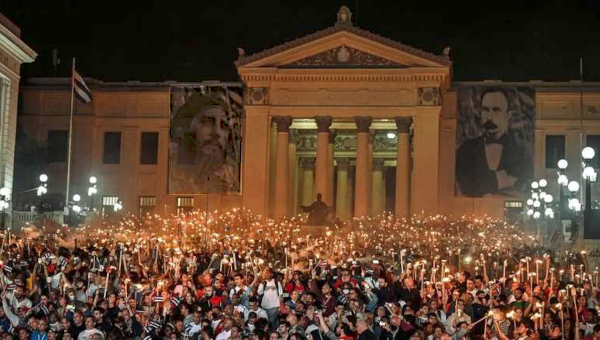Many comradely thanks and a big salute to the sender of the translation!
The Fourth Corner of the Revolution Square
By Milad S.
Khiaban #27 / July 20, 2009
Many have woken up by the warm gunpowder on the streets. The people's movement accelerates, casts its skin and pave its path. At the same time, at three corners of the Revolution Square in Tehran, old ideas comment on the movement.
1. Some, not few in numbers, declare, "See! This is the twittering of the Green Reform on the internet and the victory of the Middle class! See! This is the solution to the suffering of all, something like Embrahim Nabavi (a satirist, known for his anticommunism _ trans. note).” They say: This is the rare presence of a new generation that hates the Revolution: Armed with Reason and caring for Capital and with genuine respect for public and private property, they have started their movement. Guided by TV broadcasting from faraway places, they carry on a peaceful struggle. These people don't trespass the limits of the Islamic Republic because deep inside they are liberal Muslims, and being liberal means being contemporary, and contemporaneity is something like what in Persian we call the dialogue between civilizations plus multicultural music styles.
Many have woken up by the warm gunpowder on the streets. The people's movement accelerates, casts its skin and pave its path. At the same time, at three corners of the Revolution Square in Tehran, old ideas comment on the movement.
1. Some, not few in numbers, declare, "See! This is the twittering of the Green Reform on the internet and the victory of the Middle class! See! This is the solution to the suffering of all, something like Embrahim Nabavi (a satirist, known for his anticommunism _ trans. note).” They say: This is the rare presence of a new generation that hates the Revolution: Armed with Reason and caring for Capital and with genuine respect for public and private property, they have started their movement. Guided by TV broadcasting from faraway places, they carry on a peaceful struggle. These people don't trespass the limits of the Islamic Republic because deep inside they are liberal Muslims, and being liberal means being contemporary, and contemporaneity is something like what in Persian we call the dialogue between civilizations plus multicultural music styles.
They also say that the young generation doesn't know anything about 79. They say that our middle class has generated a youth that reads Kant's Perpetual Peace, is tolerant and re-interprets Political Islam. This generation has supposedly found the precious essence of life: careless about social issues, in love with parliamentarian democracy, and since this is an Iranian brand of love, it knows no limits; even the Council of Guardians (the institution that decides who is supposed to run for elections and monitors the elections, well-known for their support for Ahmadinejad) is the incarnation of Locke's ideas. They say that this youth just wants to be free like all other youngsters that we have seen in American TV series. They want a normal life in this world order and their ultimate goal is to found Islamic start-ups.
But the people on the streets, many of them seem to have attacked the symbols and limits of the Holy Republic. It doesn't look like they care much about World Bank and Council of Guardians. Sometimes, their faces and dress do not look like whatever is imagined to be the Middle Class. Their sneakers do not wear a known label.
If you pay attention, then you realize that Moussavi's economic program didn't have much to do with world market guidelines. It seemed, for whatever reason, to claim a return to the "Pure Islam" of the first year of the revolution. At any rate, there was a significant difference between that program and those who believe economy is a science and neoliberalism a scientific proposition.
It should be said that this ideological superimposition upon reality does not fit the demands of today's youth. They suffer from unemployment, are fed up with university entrance tests, with being humiliated by their foremen, fed up with TV ads, unemployment, addiction and Islamic Moral patrols. It should be said that they don't any longer stand for the impossibility of making their voices heard.
And above all, they have found a language for thinking in this popular solidarity that is books and cities away from those half-serious, half-journalistic, half ironic analyses. If you listen carefully, you will hear the echo of the 1979 slogans. These people, remember, even though all schoolbooks are filled with the upside down story of what happened between 1976 and 81, if you listen carefully, you will hear the sound of their steps on the brink of a conclusion: To turn the order upside down has a clear prospect.







No comments:
Post a Comment